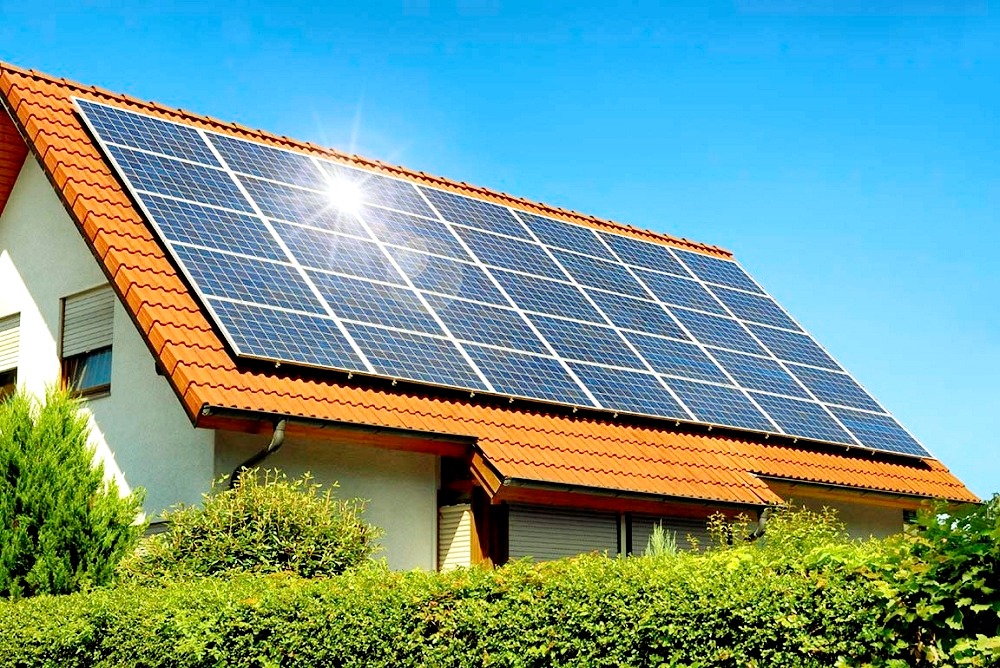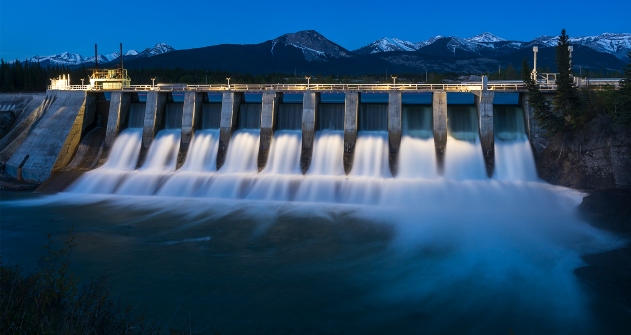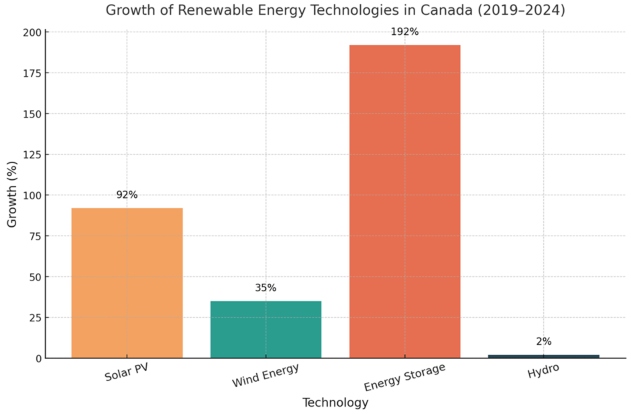Canada has never had a simple relationship with energy. It’s a country with oil sands in Alberta, massive hydro dams in Quebec, and some of the best wind resources in the world. Add in long winters, sprawling geography, and an economy that depends on both heavy industry and natural resources, and you’ve got a tough balancing act.
“Canada can be a global leader, but only if we scale investments beyond pilot projects,”
said Stephen Thomas, Clean Energy Manager at the David Suzuki Foundation. His point is blunt but accurate. The federal government has set a target of 100% clean electricity by 2035, and meeting that target will take more than a few flagship wind farms or a handful of solar rooftops.
Renewable Energy Mix in Canada Today
If you look at the numbers, hydropower still dominates. Roughly 62% of Canada’s electricity came from hydro in 2024. That’s mostly thanks to Quebec, Manitoba, and British Columbia, where rivers and geography made dam-building both feasible and politically attractive decades ago.
But the last five years have told a different story. Between 2019 and 2024, Canada’s installed capacity for wind, solar, and storage jumped 46%. That includes nearly 5 GW of new wind projects, 2 GW of utility-scale solar, and 200 MW of energy storage.
Regional differences are striking. Hydro holds the grid in Quebec and BC. Alberta and Saskatchewan have leaned into wind farms, while Ontario and the Prairies are quietly building solar capacity on rooftops and farmland.
StatCan’s 2025 forecast suggests Canada will generate about 408.98 billion kWh of renewable electricity this year – a record high, even if the growth rate is modest.
Main Renewable Energy Sources in Canada
| Source | Share of Electricity | Capacity (MW, 2025 est.) | Pros | Cons |
|---|---|---|---|---|
| Hydropower | 62% | 81,000+ | Reliable baseload, low emissions | Habitat loss, fish migration issues |
| Wind | 6–7% | 18,000+ | Cheapest new power, jobs in rural areas | Intermittency, noise, visual impact |
| Solar (PV) | 1–2% | 6,400+ | Rooftop or farm-scale, flexible | Lower output in northern winters |
| Biomass/Bioenergy | 2% | 2,000+ | Forestry jobs, waste-to-energy | Emissions, land use |
| Other (tidal, geo) | 1% | 200 | Innovation potential | High costs, early stage |
Source: Natural Resources Canada (2024–2025), Canadian Renewable Energy Association (Jan 2025), Statistics Canada, and IRENA (2024).
How Canada’s Clean Power Is Built
Canada’s energy shift is about taking the tools we already have – wind turbines, solar panels, hydro dams, even biomass – and pushing them further. Each technology brings its own wins and its own headaches, and the story really comes alive when you see how they play out in Canadian landscapes and climates.
Wind Energy
Let’s start with the obvious: wind energy is now the lowest-cost source of new electricity generation in Canada. That’s not marketing spin – it’s what the Canadian Renewable Energy Association has confirmed, and utilities know it.
We’ve seen everything from a single turbine in small towns like Richibucto, New Brunswick, to mega projects like Black Spring Ridge in Alberta, the country’s largest wind farm with 166 turbines.
Wind farms bring more than just power. Municipalities get steady tax revenues, landowners receive lease payments, and Indigenous-owned wind projects keep a fair share of benefits in local hands.

Of course, the pros and cons of wind energy are always in debate. The advantages of wind power are clear: no emissions, declining costs, reliable long-term pricing. But there are disadvantages too: noise complaints, visual impact, and bird and bat collisions. Some communities have pushed back against large projects, highlighting the disadvantages of wind farms when they’re poorly sited.
Globally, the trend is moving offshore, where winds are stronger and more consistent. Canada hasn’t built one yet, but proposals are under review.

Solar Power
If wind is the workhorse, solar is the quiet overachiever. Between 2019 and 2024, solar PV capacity in Canada grew 92%. Alberta’s Travers Solar Farm is now the largest in the country, and Ontario still leads in rooftop and community installations.
One of the most interesting trends is agrivoltaics – solar panels coexisting with farming. Alberta and Ontario have pilot sites where panels shade crops or livestock, reducing heat stress while producing electricity.
A community leader in Saskatchewan told us last year:
“It’s ironic we’re the sunniest province with so few solar panels, but that’s starting to change.”
That mix of opportunity and underuse sums up Canada’s solar story pretty well.
Hydroelectricity
Hydro remains Canada’s backbone. Big projects like Site C in BC and Muskrat Falls in Newfoundland and Labrador have grabbed headlines, though not always for the right reasons. Environmentalists point to habitat loss, fish migration issues, and the displacement of communities.
Still, when people talk about the benefits of green energy in Canada, hydro can’t be ignored. It’s reliable, dispatchable, and internationally competitive. Canada ranks third in the world for hydroelectric generation, supplying about 9% of global output.


Bioenergy & Emerging Tech
Forestry provinces like BC and Quebec have leaned into biomass as a replacement industry for shuttered pulp and paper mills. Biofuels, too, are becoming more common in agriculture, though critics warn about land use and nitrogen runoff.
Geothermal energy is still in its infancy here – Canada has no commercial plants – but Western Canada’s geology has promise. And then there’s the Bay of Fundy, home to the world’s highest tides. Pilot tidal projects there show potential, though costs and environmental impacts are still barriers.
Source: Canadian Renewable Energy Association (CanREA, By the Numbers 2025), TaiyangNews (2024), Environment Journal (2024), Natural Resources Canada / Wikipedia (Renewable energy in Canada).
Real Projects Across the Country
Looking at data is one thing, but real projects tell the story of how green energy touches lives.
Drake Landing Solar Community in Okotoks
| Feature | Detail |
|---|---|
| Location | Okotoks, Alberta |
| Homes | 52 single-detached |
| Heating coverage | 90% from solar |
| Technology | Solar thermal collectors + seasonal borehole storage |
| Energy centre | Managed solar collection, distribution & backup |
| Storage capacity | ~2,800 m² of solar collectors + 144 boreholes, 35m deep |
| Operation start | 2007 |
| Decommissioning | 2024 |
If you’ve followed Canadian clean energy, you’ve probably heard of the Drake Landing Solar Community (DLSC) in Okotoks, Alberta. Built in 2007, it was the first major North American project to use seasonal solar thermal energy storage.
For 17 years, 52 homes in the Drake Landing Solar Community in Alberta were heated by solar energy. At the heart of the system was an energy centre equipped with pumps, heat exchangers, and controls. Heat collected from rooftop solar gas water heaters was stored underground in a large field of boreholes – often referred to as the site’s “landing storage.” This unique form of solar power storage allowed excess summer heat to be banked and released in the depths of winter.
It was an extraordinary feat, and Drake Landing homeowners became quiet pioneers in what sustainable housing could look like.
By 2020, the system started showing wear. Maintenance was expensive, components for the energy centre were hard to replace, and in 2024, the solar community was decommissioned, with most homes reverting to natural gas furnaces.
Was it a failure? Hardly. The project influenced energy research worldwide, from Europe to China. The idea that the Drake Landing community in Canada heats its homes by storing solar energy may no longer be literally true, but its impact is still felt in how engineers think about solar homes, thermal energy, and long-term storage systems.
Community-Led Projects
Not every project is a mega-farm. In fact, some of the most inspiring initiatives we reviewed are community-led.
- Banff Community High School: Canada’s first LEED-certified school, equipped with rooftop solar.
- Broadway Theatre in Saskatchewan: one of the sunniest provinces putting panels on a community arts hub.
- Champion Mushroom Farm in Ontario: turning a farm into a dual producer of food and electricity.
Indigenous-led projects are especially significant. As Dean Jacobs, an Indigenous Clean Energy leader, told us:
“When communities co-own the projects, the benefits stay local.”
That principle is increasingly built into federal funding models requiring 51% or more Indigenous equity in certain new projects.
National Growth Projects
Alberta has become a testing ground for scale. Projects like Forty Mile Wind and Big Sky Solar represent hundreds of millions in investment. According to 2025 data, Canada now counts over 340 wind farms and 217 solar projects larger than 1 MW.
This scale-up is what will matter most if Canada is to actually meet its 2035 target.
Benefits Canadians Can See and Feel
All the charts and gigawatts aside, what do renewables actually mean for Canadians?
1. Affordable Power
Wind and solar are now the cheapest electricity sources in history. As costs drop, ratepayers stand to benefit.
2. Jobs
Clean energy jobs are forecast to hit 75,000 annually by 2035, totalling nearly 2 million job-years between now and mid-century.
3. Health
Fewer emissions mean cleaner air. Public health researchers link renewable energy growth to lower asthma and cardiovascular risks.
4. Equity
About 10% of households face energy poverty, spending more than a tenth of their income on power. Sustainable energy projects can lower bills and offer ownership models that include Indigenous and rural communities.
One Ontario reader told us after installing rooftop panels:
“Our winter bills dropped by a third. It’s not just about saving money – it feels like the house finally works with the seasons, not against them.”
FAQs
What are the pros and cons of wind energy in Canada?
Pros include affordability, zero emissions, and job creation. Cons include intermittency, noise, and land-use disputes. Even groups like the national green energy group networks often point out that local engagement is key to balancing these pros and cons.
What were the key lessons from the Drake Landing Solar Community?
It proved solar thermal energy storage works in Canada’s climate. The challenge was sustaining it long-term without major reinvestment. Today, newer solar companies are taking those lessons forward, designing storage systems that are cheaper and easier to maintain.
Are solar homes realistic in northern Canada?
Yes, especially when paired with hybrid systems like solar plus biomass or diesel backup. Remote Indigenous communities are leading in this space, sometimes with partnerships that include local solar companies and co-ops.
Will renewables really replace fossil fuels by 2035?
With wind, solar, hydro, and storage together – yes, it’s possible. The main barriers are political will and infrastructure investment. Some green energy group leaders argue it’s less about technology and more about getting faster regulatory approvals.
Canada’s sustainable energy story isn’t perfect. Some projects fail, some policies backtrack, and the transition feels slower than climate science says it should be. But the benefits of wind energy in Canada, the promise of solar, and the legacy of projects like Drake Landing show a country that’s learning, adapting, and building momentum.
And if there’s one thing our reviews confirm, it’s this: sustainable energy here isn’t just about numbers. It’s about healthier homes, resilient communities, and the chance to power our future on our own terms.
“Clean power isn’t just policy, it’s people – explore the stories, back the projects, and join the movement.”
